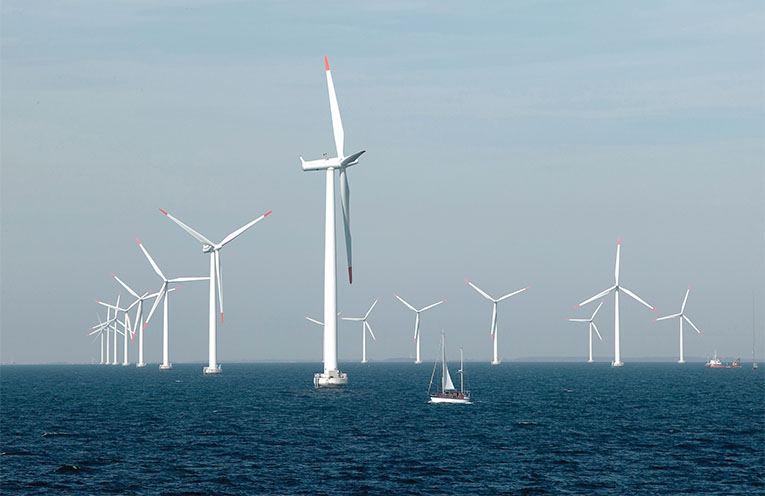A COALITION of unions, business groups, industry representatives and environment advocates have called for a “full-scale commitment from both federal and state governments” on the “responsible” delivery of an offshore wind industry in the Hunter.
“While offshore wind became a campaign issue in the seat of Paterson, voters ultimately backed Labor’s renewable energy agenda,” said a joint statement from the Hunter Jobs Alliance, HunterNet, Maritime Union of Australia and the Hunter Community Environment Centre.
“In neighbouring electorates such as Newcastle, Hunter, and Shortland, strong support for Labor’s clean energy policies reinforced the region’s clear commitment to a renewable future.”
In January 2024, 27 local organisations signed an open letter backing offshore wind development in the Hunter.
This month the coalition issued an updated letter to demonstrate strengthened support and urge more decisive action from all levels of government, including the development of a state offshore wind strategy.
In February 2025, the Federal Government officially offered Equinor and Oceanex Energy a feasibility licence for their Novocastrian Offshore Wind Farm project off the Hunter coast.
This offer is currently being assessed by the proponent.
Feasibility licences are issued for seven years, with proponents required to consult with communities and undertake environmental assessments.
Equinor and Oceanex say the offshore wind farm has the potential to generate over two gigawatts (GW) of electricity, equivalent to powering 1.2 million homes or two Tomago smelters.
The local coalition believes the offering of a single feasibility licence is a “missed opportunity”, given the believed capacity of the broader Hunter Offshore Wind Zone to deliver up to five GW of clean energy.
“Granting feasibility licences for the full five gigawatts will allow for proper environmental and economic assessment, while capping it at just two gigawatts risks undermining the viability of offshore wind in the Hunter,” said Justin Page, coordinator of the Hunter Jobs Alliance.
“If we’re serious about jobs, clean energy, energy security and long-term regional prosperity, we need to plan for the full potential from the start.”
Ivan Waterfield, CEO of HunterNet, said further projects would provide the scale to “build a genuine industry, not just a project”.
“It means three decades of design and construction work, more than 50 years of operations and maintenance, and real opportunities for long-term jobs, workforce training, domestic manufacturing, and strong regional supply chains.”
Johanna Lynch of the Hunter Community Environment Centre said the establishment of offshore wind is urgent to meet the nation’s climate goals, but stressed that it must “respect the natural environment every step of the way”.
“That’s why it’s critical that assessment and mitigation of all environmental impacts occurs at the outset, and that proponents maintain open consultation and collaboration with community members and experts with relevant local knowledge, to implement solutions to the potential impacts facing migratory bird species including the Albatross, and the marine ecosystem of the Hunter coast.”
On the other side of the fence, opponents of offshore wind development are calling for the entire process to be halted, citing inadequate community consultation and environmental concerns.
In a statement to media last week, the Newcastle and Port Stephens Game Fish Club took aim at a “botched consultation” process and a recently-released Senate inquiry.
On 3 July 2024 the Senate launched an inquiry into the “offshore wind industry consultation process”, which was set to report its findings by 13 February 2025.
After requesting several extensions, the final report was finally tabled on 5 June 2025.
The report recommended that the Department of Climate Change, Energy, the Environment and Water (DCCEEW) consider ways to improve engagement with First Nations and Traditional Owner groups, and provide “targeted and localised information for each declared area” and a “physical presence to provide information… [and] listen to concerns”.
Another recommendation was that consultation provide a “clear narrative about the broader context of offshore renewable energy”, including the need to transition away from fossil fuel.
Ongoing consultation was also recommended between proponents and local businesses, worker representatives, marine users, and community groups.
The committee additionally recommended that the Government and DCCEEW “proactively ensure that foreign actors, spam engagement, and misinformation and disinformation do not overpower local community voices from being heard in local public debate”.
Troy Radford, the President of the Newcastle and Port Stephens Game Fish Club, said the Senate inquiry once again failed to effectively consult impacted communities.
“Effectively shutting down a Senate probe into this consultation – or lack thereof – would seem to be another glaring examplé of the absence of civility by government and a dismal acceptance of regional inequality,” he said.
“For the people of Port Stephens and the Myall Coast, this Senate inquiry shutdown looks, waddles and quacks like yet another breakdown of democracy.
“For a start, consultation was so obviously botched that Federal Minister Chris Bowen ordered an independent investigation – the Dyer report.
“The result was damning and the regions understandably awaited an adequate response.
“However, once re-elected, Bowen pressed on toward simply flick-passing the consultation buck to ‘big wind’ proponents.
“Throw in a now-closed Senate probe that also didn’t consult witnesses and anyone could be forgiven for questioning why there was no fair-go, respect or integrity shown to areas like Port Stephens and the Myall Coast.”



